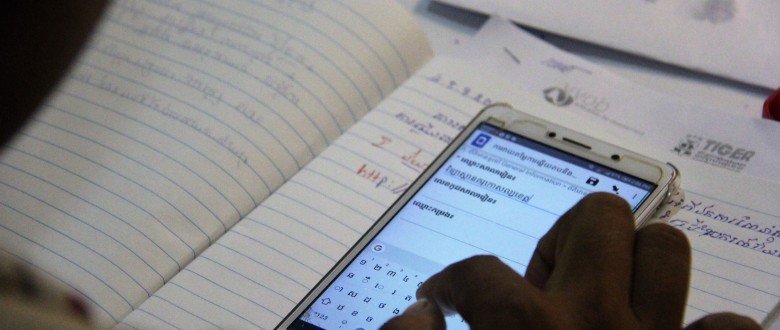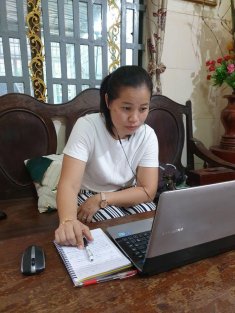
First comes health…
In an attempt to put a stop to the spread of the COVID-19 virus, nearly every country has closed its schools to some degree – most have closed all, including Cambodia – and has put measures of physical distancing in place. People in every corner of the world are staying home for the good of their and others’ health.
From day 1, our highest priority has been the health of our staff, partners and co-citizens. Our next concern is ensuring continued support to our education partners in this exceptional context.
… then comes work
Pre-pandemic, we nurtured our valued ties with our education partners – including the Ministry of Youth, Sport and Education, Ministry of Women’s affairs, teacher training institutions and practice schools – primarily through in-person contact. Capacity development activities of these partners have traditionally been face-to-face, for the most part.
Trainings and workshops, harvesting and peer learning, mentoring and coaching... our broad range of capacity development methods was studied to see how we can diversify and adapt them to uphold the quality and ensure continuity of our support from a safe distance. Today, as the crisis is gradually easing up in Cambodia, we are exploring ways to evolve to a blended approach: a combination of traditional, in-person continuous professional development (CPD) activities with ICT-based or distance CPD activities.
Here, we highlight three examples of how we adapted to the COVID-19 situation in practice in Cambodia.
Online workshops
In our SMART programme, VVOB invests heavily in CPD of teacher trainers, school leaders and model teachers. When the pandemic hit Cambodia, VVOB went fully online.
VVOB reorganised its online workshops to resemble the face-to-face activities as much as possible. Presentations are conducted live through conference tools such as Zoom and Microsoft Teams. Follow-up discussions take place via chatboxes. A bonus to online learning are the additional materials and activities, such as quizzes and assignments, that can be easily organised and shared.
Early feedback has been very positive. One of the participants, Ms. Heng Nalin, a teacher trainer from RTTC Kampong Cham shares her experience:

In response to World Environment Day (WED), we used the opportunity to include our school leaders in our online campaign by integrating the WED video in the online training on eco-friendly school environment. This showed a perfect example on how the school leaders could use the online media to make their communities and staff more aware of the importance of an eco-friendly school environment. The online methods we use to training and support our target groups are, at the same time, also way to strengthen ICT skills.
Distance mentoring
Building the competences of VVOB’s Math Taskforce is another priority on our agenda and one of the backbones of the SMART programme implementation. We received distance support on teaching numbers in primary education Grade 1-6 from our Belgium-based and experienced math expert, Marleen Duerloo.
Taking into account the pandemic and different time zones between Cambodia and Belgium, VVOB adapted its CPD approach for input training for the Math Taskforce’s capacity development. We changed our traditional face-to-face training into an online peer training session from the expert. Based on the needs of the Taskforce members, the math expert prepared materials on 3 topics: mathematical patterns; problem solving; and fraction, decimals, percentages and proportions.
Through distance mentoring from the expert, and with the use of the suggested materials, the Taskforce built their expertise on each of the topics. All knowledge and built expertise from this online mentoring experience will be captured in the development process of the Numbers Manual, which VVOB is finalizing at the moment for use in the teacher training institutions and practice schools. The Numbers Manual is linked to the Cambodian curriculum and offers guidance to Teacher Trainers and Model Teachers on how students can be encouraged to explore new ways of learning numbers, embedding meaningful real-life activities and problems.
Coaching over internet or phone
VVOB has created a new manual on how to conduct coaching sessions online or over the phone. The manual is a go-to resource for becoming a good remote coach and includes a refresher course on the GRROW (goal, reality, resources, options and way forward) model and the 7 coaching skills of Jef Clement – the coaching model used by VVOB, as well as practical tips and coaching questions.
Based on the framework of the EU-co-funded TIGER project, the manual specifically supports TIGER coaches to continue their individual coaching sessions with the management and teaching staff of the Battambang Teacher Education College and TIGER schools (schools that are undergoing a transformation into gender-responsive schools). An action guide was developed for that transformation and any obstacles schools experience when putting the guide’s theory into practice are addressed during individual coaching sessions. These sessions are now organised online and over the phone by the TIGER coaches hailing from VVOB, KAPE, PKO and partner Civil Society Organisations (CSOs).
Engaging in coaching from a distance is quite different from face-to-face coaching. Certain crucial social cues like eye contact, body language, facial expressions, and tone of voice are limited, or absent. But, if the guidelines in the manual are properly applied, there are no real limitations to remote coaching compared to face-to-face coaching.
Find out how VVOB continued its support to education partners in Zambia and Rwanda too.




